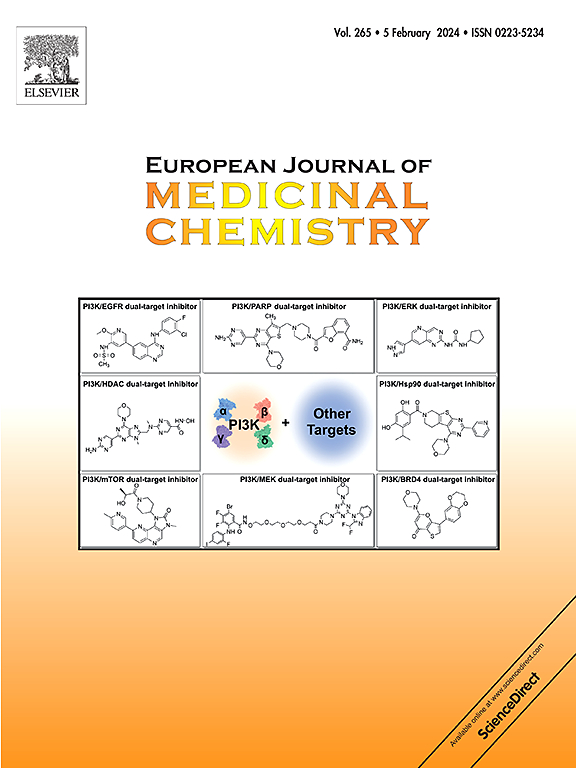Modulation of FLT3-ITD and CDK9 in acute myeloid leukaemia cells by novel proteolysis targeting chimera (PROTAC).
IF 5.9
2区 医学
Q1 CHEMISTRY, MEDICINAL
引用次数: 9
Abstract
Oncogenic mutations in gene encoding FLT3 kinase are often detected in acute myeloid leukaemia (AML) patients, and several potent kinase inhibitors have been developed. However, the FLT3 inhibitor treatment often leads to the resistance development and subsequent relapse. Targeted degradation of oncogenic protein kinases has emerged as a feasible pharmacological strategy, providing more robust effect over traditional competitive inhibitors. Based on previously developed competitive inhibitor of FLT3 and CDK9, we have designed and prepared a novel pomalidomide-based PROTAC. A series of biochemical and cellular experiments showed selectivity towards FLT3-ITD bearing AML cells and confirmed proteasome-dependent mechanism of action. Dual FLT3-ITD and CDK9 protein degradation resulted in the block of FLT3-ITD downstream signalling pathways, apoptosis activation and cell cycle arrest of FLT3-ITD AML cells. Moreover, transcriptional repression caused by CDK9 degradation significantly reduced expression of crucial genes involved in AML pathogenesis. The obtained results indicate the beneficial impact of simultaneous FLT3-ITD/CDK9 degradation for AML therapy.新型蛋白水解靶向嵌合体(PROTAC)对急性髓系白血病细胞中FLT3-ITD和CDK9的调节。
在急性髓性白血病(AML)患者中经常检测到编码FLT3激酶基因的致瘤突变,并且已经开发出几种有效的激酶抑制剂。然而,FLT3抑制剂治疗经常导致耐药发展和随后的复发。靶向降解致癌蛋白激酶已成为一种可行的药理学策略,提供比传统竞争性抑制剂更强大的效果。基于先前开发的FLT3和CDK9竞争性抑制剂,我们设计并制备了一种新的基于泊马度胺的PROTAC。一系列的生化和细胞实验显示其对携带FLT3-ITD的AML细胞具有选择性,并证实了蛋白酶体依赖的作用机制。FLT3-ITD和CDK9蛋白的双重降解导致FLT3-ITD下游信号通路阻断,FLT3-ITD AML细胞凋亡激活和细胞周期阻滞。此外,CDK9降解引起的转录抑制显著降低了参与AML发病机制的关键基因的表达。获得的结果表明FLT3-ITD/CDK9同时降解对AML治疗的有益影响。
本文章由计算机程序翻译,如有差异,请以英文原文为准。
求助全文
约1分钟内获得全文
求助全文
来源期刊
CiteScore
11.70
自引率
9.00%
发文量
863
审稿时长
29 days
期刊介绍:
The European Journal of Medicinal Chemistry is a global journal that publishes studies on all aspects of medicinal chemistry. It provides a medium for publication of original papers and also welcomes critical review papers.
A typical paper would report on the organic synthesis, characterization and pharmacological evaluation of compounds. Other topics of interest are drug design, QSAR, molecular modeling, drug-receptor interactions, molecular aspects of drug metabolism, prodrug synthesis and drug targeting. The journal expects manuscripts to present the rational for a study, provide insight into the design of compounds or understanding of mechanism, or clarify the targets.

 求助内容:
求助内容: 应助结果提醒方式:
应助结果提醒方式:


